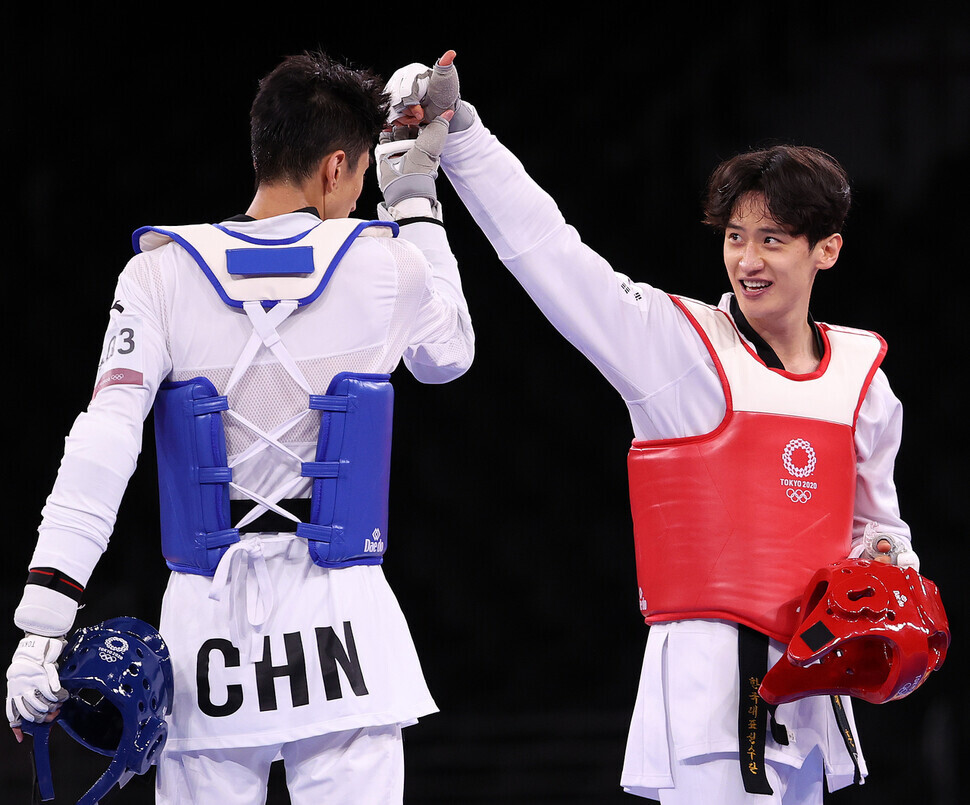hankyoreh
Links to other country sites 다른 나라 사이트 링크
With 21 countries winning Olympic medal, taekwondo has become truly global sport, hope for medal thirsty nations

Russia, the US, Serbia, Uzbekistan, Italy, Croatia and Thailand were the countries that won gold medals in taekwondo at the 2020 Tokyo Olympics.
Russia took home two of the eight gold medals in play in the category, with the other six countries each claiming one. The spoils were split among three continents: two gold medals went to Asia, one to North America, and five to Europe.
Strikingly, four of the gold medals were won by countries in Eastern Europe. When the silver and bronze medals are added in, 21 countries took home 32 medals. There were also three countries — Uzbekistan, North Macedonia, and Israel — that won an Olympic medal in taekwondo for the first time.
Despite being the home of taekwondo, South Korea ended up ranking ninth in the category, with two bronze medals, one silver, and no golds.
This year’s Olympics showcased the globalization of taekwondo. There are currently 210 member states in World Taekwondo (WT). That’s second only to the FIFA, the governing body of association football, in terms of membership in international sports federations.
Taekwondo athletes were fielded by 61 countries at the Tokyo Olympics, including the refugee team. More than 10 taekwondo athletes were flag bearers during the Parade of Nations at the opening ceremony, underlining the prominence of taekwondo in those countries.
Adriana Cerezo Iglesias amused Koreans when she showed up at the finals wearing a black belt that said, in Korean, “gicha hadeu, kkum keun,” a mistranslation of the slogan “train hard, dream big.” (The syntax of the phrase is jumbled, and “gicha” means “railway train,” not “train to learn a skill.”)
The biggest reason for the globalization of taekwondo is that the entry barrier isn’t high. You don’t need any special equipment to play.
That means taekwondo can be enjoyed in any country, regardless of its economic status. That’s also why WT has been promoting taekwondo in refugee camps in Jordan, Turkey and Rwanda since 2015.
The New York Times reported Monday that “taekwondo is perhaps the most generous” of all Olympic events and that the sport had given “nations that exist on the margins of international sport” the hope of triumphing in the games.
Indeed, it was in taekwondo that Côte d’Ivoire and Jordan won their first and only gold medals, during the 2016 Olympics, held in Rio de Janeiro.
The only two Olympic medals won by athletes from Afghanistan came in the category of taekwondo in Beijing in 2008 and London in 2012.
In line with the sport’s globalization, some experts say that Koreans ought to reflect upon the spirit of taekwondo rather than their dwindling number of gold medals in the category.
“Globalization has positive aspects. Korea will remain the home of taekwondo even if it doesn’t win gold medals. If anything, athletes may come to admire [Korea] as the land of taekwondo,” said Chung Yong-cheol, a professor of sports psychology at Sogang University.
“Olympic medals aren’t the highest good. Indeed, it’s time for Koreans to reflect upon whether they’re actually living up to the spirit of taekwondo,” Chung observed.
Others say the rules of the game need to be revised. Lee Dae-hoon, 29, one of Korea’s best taekwondo athletes, criticized the current scoring system while announcing his retirement from the sport in Tokyo on Monday.
“Right now, athletes play [defensively] to avoid losing points,” Lee said.
Taekwondo points are currently assessed using sensors on the players’ feet, hands and protective gears. That system was implemented after questions were raised about fairness while taekwondo was being installed as an Olympic sport.
But now that taekwondo has become a truly global sport, a stronger case can be made that judges, rather than sensors, should decide points and that the rules about kicks and other attacks should be tweaked to make the competition more exciting.
By Lee Jun-hee, staff reporter
Please direct comments or questions to [english@hani.co.kr]

Editorial・opinion
![[Column] Season 2 of special prosecutor probe may be coming to Korea soon [Column] Season 2 of special prosecutor probe may be coming to Korea soon](https://flexible.img.hani.co.kr/flexible/normal/500/300/imgdb/original/2024/0426/3317141030699447.jpg) [Column] Season 2 of special prosecutor probe may be coming to Korea soon
[Column] Season 2 of special prosecutor probe may be coming to Korea soon![[Column] Park Geun-hye déjà vu in Yoon Suk-yeol [Column] Park Geun-hye déjà vu in Yoon Suk-yeol](https://flexible.img.hani.co.kr/flexible/normal/500/300/imgdb/original/2024/0424/651713945113788.jpg) [Column] Park Geun-hye déjà vu in Yoon Suk-yeol
[Column] Park Geun-hye déjà vu in Yoon Suk-yeol- [Editorial] New weight of N. Korea’s nuclear threats makes dialogue all the more urgent
- [Guest essay] The real reason Korea’s new right wants to dub Rhee a founding father
- [Column] ‘Choson’: Is it time we start referring to N. Korea in its own terms?
- [Editorial] Japan’s rewriting of history with Korea has gone too far
- [Column] The president’s questionable capacity for dialogue
- [Column] Are chaebol firms just pizza pies for families to divvy up as they please?
- [Column] Has Korea, too, crossed the Rubicon on China?
- [Correspondent’s column] In Japan’s alliance with US, echoes of its past alliances with UK
Most viewed articles
- 1‘We must say no’: Seoul defense chief on Korean, USFK involvement in hypothetical Taiwan crisis
- 2Is Japan about to snatch control of Line messenger from Korea’s Naver?
- 3No good, very bad game for Korea puts it out of Olympics for first time since 1988
- 4Samsung subcontractor worker commits suicide from work stress
- 5[Editorial] Korea’s surprise Q1 growth requires objective assessment, not blind fanfare
- 6Division commander ordered troops to enter raging flood waters before Marine died, survivor says
- 7N. Korean delegation’s trip to Iran shows how Pyongyang is leveraging ties with Moscow
- 8Korea’s 1.3% growth in Q1 signals ‘textbook’ return to growth, says government
- 9Flying “new right” flag, Korea’s Yoon Suk-yeol charges toward ideological rule
- 10[Column] Park Geun-hye déjà vu in Yoon Suk-yeol